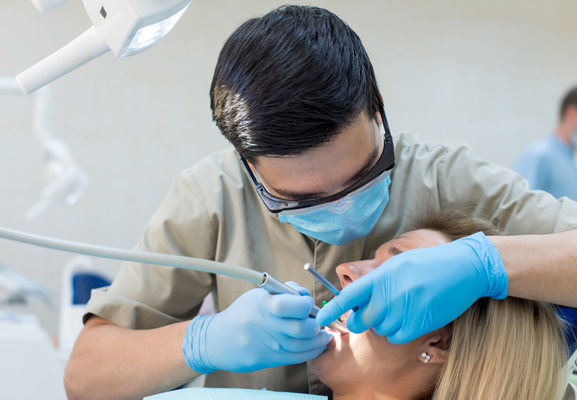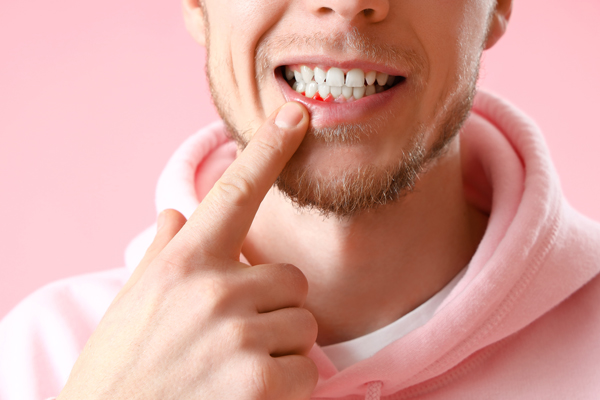Can an Oral Piercing Have an Effect on Your Oral Health?

Oral piercings are a form of self-expression and have become increasingly popular among teenage boys and girls, and although they may seem harmless, this form of body art can bring some complications, including oral health issues. Many areas of the mouth can be pierced, but the tongue and lips are the most common spots. Because the area is continuously exposed to moisture, it becomes an ideal breeding ground for bacteria, sometimes causing adverse health side effects.
How oral piercings can affect oral health
Tongue rings can lead to infection and swelling if improperly taken care of. Depending on a person's overall health, these infections can cause other health issues. However, these are not the only effects to your health. The jewelry itself can break off in your mouth and damage or cut the inside of your cheeks, tongue or throat. You can also chip your teeth while you eat, talk or sleep from the metal of the piercing. Most of the times these are relatively minor issues, but the possibility of them being more severe is always there.
Other oral piercing effects on oral health:
- Difficulty speaking, chewing and swallowing
- Damaged tongue, gums, and fillings
- Difficulty taking an X-ray of your teeth
- Allergic reaction to the metal in jewelry
- Chipped or cracked teeth
It is easy for the jewelry to bump against your teeth when speaking or eating. This frequent contact can chip the tooth enamel. Biting down on it can also cause cracks that extend to the nerves of the tooth, which could require a root canal to fix. Because of these detrimental effects, the American Dental Association advises against the use of tongue, lip and uvula rings. Because of the risks involved such as damage to teeth, the safest path is avoiding oral piercing altogether.
How to avoid problems
If you already have an oral piercing, by taking the right steps, you can continue to have good teeth and oral health. Taking care of your piercing properly will help you maintain good oral hygiene and avoid any of the issues covered above. First, start by choosing the right type of jewelry works well with the location in your mouth, and will not cause damage if it bumps against your teeth.
Also, avoid playing with the piercing using your tongue or teeth. It can be tempting, but it has the potential to damage your teeth and gums. Also, check the piercing daily to ensure the ends are properly fastened. Keep the site clean and free of any grime or food particles by using a mouth rinse after every meal. Check the tightness of the ring periodically to prevent it from coming loose being swallowed or accidentally bitten down on. If you play any sports, remove the jewelry and re-insert it when you are done.
Where the piercing is can make all the difference
If you have a tongue piercing, make sure to use polymer balls to reduce the risk of damaging your teeth. Choose a smaller ball for the underside of your tongue to lower the risk of contact with your sublingual. More importantly, keep your mouth as clean as possible by brushing and using mouthwash after every meal.
Practice good oral hygiene
When you have an oral piercing, practicing basic oral hygiene should be an even greater priority. Strictly adhere to a professional’s recommendation of brushing and flossing twice daily. The last thing you want is for an infection to develop.
Do you have more questions about how to take care of your oral piercing and teeth? Contact us here: http://www.gatewaydental.org or call Gateway Dental Dr. William Swann DDS at (301) 485-7492 for an appointment in our Bowie dental office.
Recent Posts
Cavities are a common occurrence, and dental fillings are usually the preferred solution to tooth decay, regardless of how minor the decay may be. More severe cavities, those that have reached the nerves and are causing discomfort, usually always require a filling. However, there are instances when you can heal smaller cavities naturally from the…
Probiotics are good bacteria that are popular for their contributions to healthy digestion; however, scientists are starting to believe they contribute to dental health, too. Although the U.S. Food and Drug Administration has not endorsed the medical use of oral probiotics, many studies have shown that probiotics can help your dental health.Our mouth contains different…
Most dentists agree that chewing sugar-free gum is beneficial for the health of teeth! Many people group gum chewing into the same group as candy. However, this is hardly the case when it comes to sugar-free gum. In fact, most dentists may instruct their patients to chew sugar-free gum to help in cleaning the teeth…
The different types of floss and tips for flossing make it possible to keep the tight spaces between teeth free of food particles and plaque. That goes a long way when it comes to fighting tooth decay. Dental floss is used to remove the plaque, food particles and bacteria that become lodged between teeth after…


